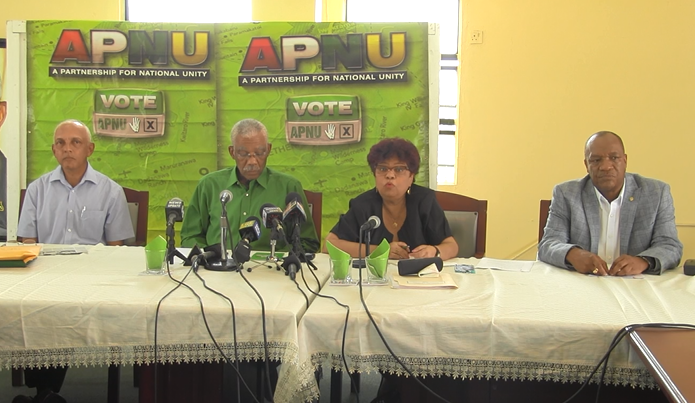Minister of Communities Ronald Bulkan has accused the Peoples Progressive Party Civic (PPP/C) of attempting to delay Local Government Elections (LGE) in some areas in light of its recent court action.
Opposition-aligned Commissioner on the Guyana Elections Commission (GECOM) Bibi Shaddick has filed an application in the High Court, challenging the creation of seven new local authority areas and restructuring 14 others.
She has argued that the changes are unlawful, mainly because the Minister and the GECOM did not consult with the relevant stakeholders including voters and political parties.
But Bulkan, at a press conference Friday to announce the launch of the A Partnership for National Unity (APNU) LGE campaign, said he is not too concerned about the legal challenge.
“We are not unduly concerned,” he said, adding that he believes the main accusation is that he acted “undemocratically” and not unlawfully.
Bulkan defended his decision to make the changes to the local authority areas, explaining that the move will see more people empowered to take control of their communities.
The Communities Minister, who serves as Treasurer to the APNU, said he is confident that the charges will be proven to be frivolous.
APNU will be contesting the upcoming elections separately from its partner in government, the Alliance For Change (AFC).
Party Chairman President David Granger said APNU will be contesting in 76 of the 80 Local Authority Areas.
The areas where they will not be contesting are from Regions One, Two and Four and Six.
He explained that while the APNU will not be contesting in some areas, it will be lending support to individual candidates and smaller parties.
In fact, the Party has already taken under its wing, several individual candidates and smaller parties that have expressed an interest in contesting the elections.
President Granger explained that such a strategy is actually better for democracy as it would help those candidates succeed.
Noting that preparing to contest elections require a lot of mobilization and resources, Mr Granger said it would be better for contesting candidates to be backed by an organisation.
“We encourage people who do not belong to the APNU but who share our ideas to come in and work with us and campaign,” he posited.
Mr Granger noted too that: “The voters themselves would want to know that year after year, they’ll be able to contact the persons they’ve elected.”
On the converse, he said without the necessary support, an individual candidate’s campaign may come to a “sticky end.”












